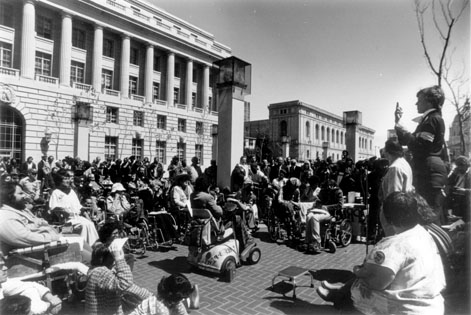People with Disabilities are the largest minority group in this country; one in five people in the U.S. experience life with a disability. However, as a nation we rarely discuss the struggle for policy wins and the organizing that has created those wins. Even more rare is the conversation about how ableism, the discrimation against people with disabilities, is deeply embedded in all aspects of our society.
Hand in Hand offered a training on July 21st to talk about just that. Attendees included domestic workers, domestic employers, people with disabilities, and allies looking to learn more. We talked about the definition of the word ableism and the language used to describe people with disabilities. What words or phrases are patronizing? What language is infuriating? What feels nuanced? Our facilitators, Nikki Brown Booker and Jessica Lehman, talked about the intersections of racism and ableism that cause disproportionate impacts on people of color, and also spent some time talking about the history of ableist laws in the US that resulted in incarceration and institutionalization of people with disabilities.


We looked back to key moments in history and the fight for disability justice like the 504 sit-in, an incredible month-long occupation of a federal building (a feat at any time, but one that feels particularly poignant in this moment, as federal troops pick people off the street in our cities and defend federal property with all but lethal force). We talked about the Capitol Crawl and the thirtieth anniversary,of the Americans with Disabilities Act.
Finally, we asked ourselves—where do we go from here? How we can create joyful and accessible spaces for all, and how we can ensure that our value of interdependence is centered in our work. We talked about how joining the movement to support people with disabilities is crucial to creating a world that is more just in all ways, and how we can speak out in our lives to bring more people into our work.
Hand in Hand will continue this work in our organization broadly and in each of our chapters, prioritizing accessibility and working to dismantle ableism in our organization and communities. And we also commit to continuing these conversations and making space for ongoing growth and learning across our membership.
